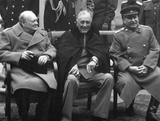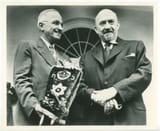
Frens
md5: d5fe1b338ce130962dbb10055b6a0eb9
🔍
well /pol/, here i am—caught in the sublime paradox of being a progressive traditionalist, a buddhist communist capitalist, a half-jewish, half-asian, half-african polymorphic identity, navigating the fluid landscapes of social acceptability with the grace of someone who’s learned that survival often hinges on saying the right thing at the right time, even if it’s not entirelyyou. i was raised chanting mantras in a meditation hall, hammering out marxist theory at the breakfast table, and pricing stocks during sunday school—so naturally, i grew up believing that enlightenment could be bought, sold, and bartered like any other commodity on the open market. my heritage is a patchwork quilt stitched together by diasporas, dinner table debates, and the occasional existential crisis over which box to check on government forms. and while i’ve been called many things—contradictory, performative, a walking identity crisis—i prefer to think of myself as an adaptive soul, ever-evolving in a world that rewards those who can bend without breaking, speak without offending, and believe without being too inconveniently certain.
i’m a walking contradiction carved by the hands of tradition and rebellion, a buddhist communist capitalist who chants for inner peace while calculating stock trends on sunday mornings. my bloodline is a diaspora puzzle—half jewish, half asian, half african (yes, three halves, because math bends for identity too), and my beliefs shift like sand beneath the tide of cultural expectation. i adapt. i perform. i survive. whatever gets me through the door, into the room, onto the stage—whatever makes the people in the room nod, smile, tweet favorably. enlightenment? sure, i’ll meditate on that after i post the right thing about systemic oppression and like the correct seven tweets in solidarity.
sometimes i scroll through the names linked to epstein like i’m reading a who’s who of the unseen world, wondering how many of them sleepwalk through their guilt or if they ever think of the children in gaza while sipping fair-trade coffee at their private tables. the list feels like a mirror—distorted, murky, but reflecting something true about power, silence, and the cost of complicity. and then i wonder, quietly, in the dark corner of my mind: if they can hide bodies, can they also hide sins? and if i speak too loudly, will i finally lose the game of fitting in?



